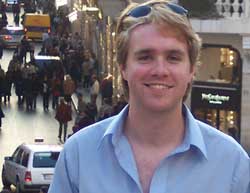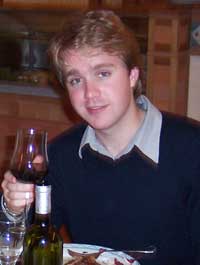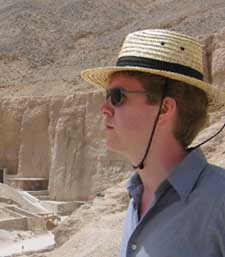Text of a Speech Delivered on Sept. 2, 2004, Parents & Friends Lounge
by Jordan H. Gaul, IV ’05
 In the words of the old Sammy Cahn song, “It’s nice to go travelin’, but it’s oh, so nice to come home.” It’s great to be back at Hampden-Sydney, and I’d like to tell you some of my general impressions about the value of a foreign study program.
In the words of the old Sammy Cahn song, “It’s nice to go travelin’, but it’s oh, so nice to come home.” It’s great to be back at Hampden-Sydney, and I’d like to tell you some of my general impressions about the value of a foreign study program.
I grew up on the banks of the Brandywine River, in Downingtown, Pennsylvania – about an hour’s drive outside of Philadelphia. Downingtown is located someplace in that indefinite swath of farmland where the suburbs end and the great sprawling countryside that stretches through Lancaster County and across the Appalachians begins. When I was very young, a trip to Pittsburgh to visit my aunt and uncle seemed to me to be an expedition of unfathomable scope, and strangely enough it still retains something of the mystique of my early youth. I grant that, in the history of letters, no one has ever tried to argue that Pittsburgh – of all places – is somehow an exotic destination. But this feeling of mine has nothing to do with time or space: the trip which I make several times each year from my home in Chester County, PA, to Hampden-Sydney is longer by both measures. It has to do, I think, with a kind of imagined boundary, running between the places I know and those I do not. I have never been further west than 80 degrees longitude, although I did once make a trip to Lexington, Virginia, just scraping against the meridian. Someday, I am resolved to see the American West: but for now, for me, it exists only as an abstraction, as does, indeed, anything beyond the Ohio River. Neither is a great distance, or unreachable, but both are still foreign to me in the sense that they are unknown.
 There is a word in German, Wanderlust, which is as close to a perfect cognate as any I can think of. It refers to a “moving-desire,” which is to say, a hunger for travel. It’s something primal, irrational, something intensely human. And, I suspect that precisely this fundamental human impulse, the urge to move, is related to the great migratory patterns that shaped the hazy era of human prehistory. For the past few years, leading up until last summer, I had known it well. Indeed, it had come to a spiritual boil: I simply had to go and see what else was out there. My life had been remarkably settled up until this year, in which I have seen the great ruins of classical antiquity in Rome (and eaten superlatively well on the staples of their modern cuisine); watched hazy, golden sunsets in southern France; discussed subtleties of reformation theology late at night, while overlooking the waves of the North Sea in St. Andrews;
There is a word in German, Wanderlust, which is as close to a perfect cognate as any I can think of. It refers to a “moving-desire,” which is to say, a hunger for travel. It’s something primal, irrational, something intensely human. And, I suspect that precisely this fundamental human impulse, the urge to move, is related to the great migratory patterns that shaped the hazy era of human prehistory. For the past few years, leading up until last summer, I had known it well. Indeed, it had come to a spiritual boil: I simply had to go and see what else was out there. My life had been remarkably settled up until this year, in which I have seen the great ruins of classical antiquity in Rome (and eaten superlatively well on the staples of their modern cuisine); watched hazy, golden sunsets in southern France; discussed subtleties of reformation theology late at night, while overlooking the waves of the North Sea in St. Andrews;  and even surveyed the Valley of the Kings amid the brutal majesty of the Egyptian heat. To say nothing of the many evenings I spent in London (cf.: “Varsity Students’ Rag,” John Betjeman), or the money I burned on little indulgences, of which I regret not so much as a single penny.
and even surveyed the Valley of the Kings amid the brutal majesty of the Egyptian heat. To say nothing of the many evenings I spent in London (cf.: “Varsity Students’ Rag,” John Betjeman), or the money I burned on little indulgences, of which I regret not so much as a single penny.
This year, of course, was the year I went to Oxford. There is some dispute over whether I, or others, have enjoyed this most, depending upon whom one asks, and on which campus. I flatter myself to think I’ve had most of the fun, though.
Enough has been said elsewhere, and with H-SC sending a trickle of young men to St. Anne’s every summer, presumably more will be said in the future, about the virtues of the Oxford system. But the institution’s reputation hardly requires my exposition. To praise it would be in bad taste, and I will refrain from that particular narrative sin. There is only so much that can be accomplished through the purely anecdotal anyway. No stories, no matter how engaging, could really portray my experience accurately. There is a unique thrill to traveling, a thrill which is only multiplied by living in close quarters with a foreign people for an extended time.
In the end, much of what we learn makes interesting telling, but the most important details can’t properly be put into words. They are purely experiential; they consist in the moment, in the doing, in the gradual acclamation to the intangible rhythms of daily life. The most important things we learn in life we cannot read or hear. No good advice, no matter how compellingly stated, can ever convince us to alter ourselves – in a genuine or meaningful way – unless we have lived out its consequences; no principles of human nature, even if believed when illuminated second-hand, are ever fully grasped until they have been seen with our own eyes; no descriptions of people or places can approximate the visceral sensation of speaking to, or touching, them. And nothing in books or pictures or what we are told can tell us too much about the things we think we love. And yet we live second-hand lives, relying for our conception of reality on external information.
Living overseas and traveling around the world, in even just the gasp of a year’s time, has opened my mind to so much, and allowed me, if even for a little while, to live first-hand. I had a diversity of experiences this year. I played poker with Phil Hellmuth; had dinner with Peter Hitchens; heard Noam Chomsky lecture; saw Michael Heseltine lambaste the Blair government; met more members of Parliament than I can recall; and stood at the Graves of Nelson, Wellington, and Blake. I spoke at the same dispatch box as Gladstone and Disraeli and defended free trade before the Oxford Union. I walked daily down the cobbled streets where Latimer, Ridley, and Cranmer were martyred for the faith of the English people. I saw the Pieta of Michelangelo, and knelt in the Chapel of the Most Holy Sacrament, in St. Peter’s Basilica. And I stood as close to the spear point that pierced the flesh of Christ on the Cross as I am to you now. So much of this is not a visual experience. It is spatial. To share in the same physical relationships of enclosed areas and forms as great men throughout history; to see the light at precisely the midday angle they would have hundreds – or, in the case of my travels in North Africa, thousands – of years ago; to smell the same local foliage and to have the same flesh and drink marinating in your guts, is a transcendent feeling. I felt it once before, when I stood in the old Senate chamber in Washington, DC, before I recited part of Webster’s 1830 speech on the Foot resolution. But, in England, and traveling through Europe and Africa, history is everywhere, and accessible in the most intimate and immediate way to anyone who is interested in it. The chance only needs to be seized.
Last year was the greatest year of my life, and I encourage you all to go ahead and to take advantage of the opportunities that I did.